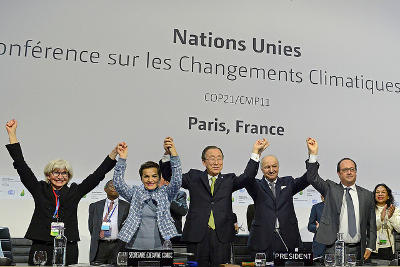Using AI to control energy for indoor agriculture
30 September 2024
Published online 17 December 2015
Three leading Gulf region scientists share their views on COP21’s final agreement.

Here, scientists in the Gulf region assess the agreement’s pros and cons, and contemplate the challenges it will potentially present in this part of the world.
The Paris agreement
”The scientific underpinnings of climate change are now so robust that they were not disputed by any of the parties at COP21. The agreement sets clear goals, informed by science, which, if complied with, will avert climate change from reaching a dangerous state.”
Sinks and Emissions
”The Gulf Co-operations Councils (GCC) countries lack significant terrestrial sinks like forests; [instead they] have mangroves, seagrass and salt-marsh stands along their extensive shores, which in some regions have experienced steep decline. GCC nations are now developing the scientific infrastructure to be able to manage these ecosystems for climate change mitigation and adaptation.
I published [research] in 2005 that provided the first evidence that those vegetated coastal habitats were globally-relevant carbon sinks. Unfortunately, over 50% of these ecosystems have been lost over the past 50 years, resulting in a loss of CO2 sink capacity and emissions.”
The Paris agreement
“The COP21 agreement is a turning point. However [it] almost entirely focuses on the emission reduction, which surely decreases the pace, but will not stop global warming. In this sense the initiative of African countries to pursue an aggressive reforestation is extremely useful, but not sufficient. Atmospheric carbon removal will be absolutely necessary to meet the 1.5˚C goal. A lot needs to happen on the [national] level to achieve those targets. So COP21 brings a lot of promise but all [the] hard work is ahead.”
Research
“The major problem for active research in this field is poor empirical basis in the MENA region. We have little in situ observations in Africa and over the Arabian Peninsula. We need high-quality consolidated datasets of major meteorological and solar radiation parameters to test and calibrate our models. This will require the development of culture of cooperation, data exchange, and data storage that is currently very poor in the region.”
Solar energy
“The solar abundance in the GCC is hampered by the negative impact of dust on efficiency and durability of solar panels. [But] GCC countries […] have ambitious plans to use renewable energy to decrease the domestic oil and gas consumption. Saudi Arabia for example plans by 2032 to produce more than 70% of electricity using wind and solar.
Technology transfer is crucial — not only facilitating and subsidising the acquisition of the latest equipment, but also building in-country expertise and improving education and technical training.”
The Paris agreement
”The news from Paris was about as good as I hoped. [But the real] test will come in 2020 when countries are supposed to contribute new emissions-cutting plans.”
Mitigation and adaptation
”For mitigation we need to aggressively pursue energy conservation and efficiency in the building, transportation and industrial sectors. It would help for economic structures to be less dependent on industry over time as it is difficult to meet heavy industry energy demand in a clean way without access to hydro power and bioenergy. We also need to deploy renewables in the power sector.
For adaptation, we need to be ready for possible increased temperatures and rising sea levels. The work we are doing now has been toward GCC specific air-conditioning systems and ventilation systems that account for high humidity and significant temperature cycling.”
Renewables
“Even if GCC countries have massive renewables deployment for the power sector, industrial energy demand and transportation may limit the extent to which total final energy consumption is met by renewables. At Masdar Institute we did the UAE REMap 2030 study with IRENA and found that the UAE can realistically realize a 10% share of renewable energy in the total final energy consumption by 2030. Hopefully, the GCC countries will follow Dubai’s lead in aggressive plans for solar deployment in power.”
doi:10.1038/nmiddleeast.2015.244
Stay connected: